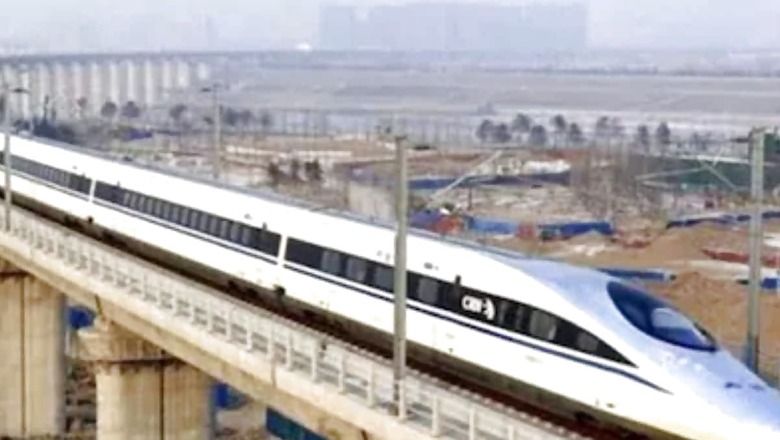
views
A significant milestone in India’s ambitious Mumbai-Ahmedabad Bullet Train Project was achieved on Tuesday with the completion of a 210-meter-long prestressed concrete (PSC) bridge over National Highway 48 at Navsari, Gujarat. This accomplishment marks a crucial step in the realisation of India’s first high-speed rail corridor, designed to connect Mumbai in Maharashtra with Ahmedabad in Gujarat, bringing enhanced connectivity and cutting-edge infrastructure to the region.
The corridor, spanning over 500 kilometres, passes through both Gujarat and Maharashtra. One of the major engineering challenges faced during construction was the need to cross over National Highway 48, a key highway linking Delhi to Chennai. The new bridge at Sisodra village in Navsari district of Gujarat is part of an elevated viaduct and was constructed to help facilitate this crossing. The bridge will play a key role in linking the Billimora and Surat bullet train stations, creating seamless travel between two important junctions of the route.
The bridge was constructed using the Balanced Cantilever method, a highly specialised engineering technique employed for long-span bridges. The 210-meter bridge is the second post-tensioned segmental concrete (PSC) box bridge completed on this route, and it features a total of 72 precast segments, with the spans configured as 40 meters, 65 meters, 65 meters, and 40 meters. The construction team faced the challenge of launching these segments over NH-48, which is one of the busiest highways in the country. The entire process demanded meticulous planning, precise execution, and coordination to ensure minimal disruption to traffic and highway operations.
With NH-48 being a major thoroughfare, the construction process required advanced traffic management strategies to avoid major delays for commuters. Despite the complex logistics involved in working over such a busy road, the installation proceeded smoothly, demonstrating the technical expertise and efficiency of the teams involved. This latest achievement marks another successful milestone in the bullet train project, which is expected to bring about faster travel time and enhanced regional development in both Gujarat and Maharashtra.
However, the Mumbai-Ahmedabad Bullet Train project has been fraught with controversy, particularly in the state of Maharashtra. The project has faced significant opposition from local communities, environmentalists, and political groups. One of the primary concerns has been land acquisition, with farmers and landowners in Maharashtra voicing their displeasure at losing agricultural land. The displacement of families and the potential environmental impact on forests and wildlife have also drawn criticism. Opponents argue that the project prioritises elite infrastructure at the cost of ordinary citizens’ livelihoods.
Despite the protests, the Indian government continues to push forward with the project, emphasising its long-term benefits, including drastically reduced travel times between Mumbai and Ahmedabad and its potential to boost economic growth. Officials also argue that the bullet train project will place India among the world’s elite high-speed rail networks and significantly improve transportation infrastructure in the country.
As the Mumbai-Ahmedabad Bullet Train project progresses, the completion of the 210-meter bridge is a major step forward, bringing the country closer to realising its vision of ultra-fast rail connectivity.


















Comments
0 comment